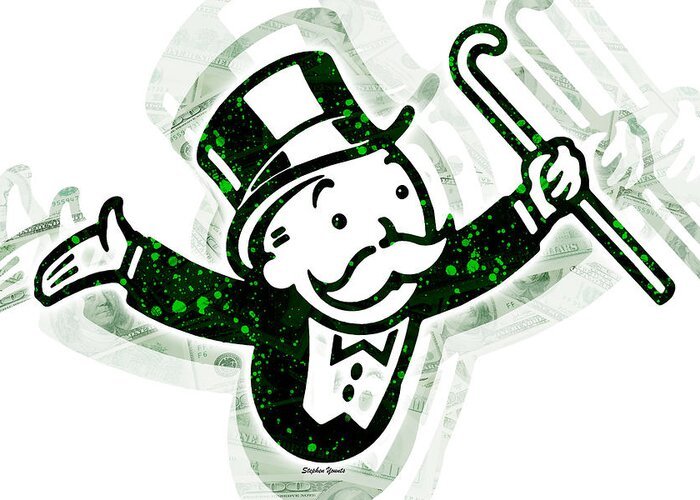
Younts, Stephen. "Monopoly Man Greeting Card." PX Merch. https://pixelsmerch.com/featured/monopoly-man-stephen-younts.html?product=greeting-card. Accessed 12 Feb, 2025.
What is monopoly power? Monopoly power is the ability of a company to control the prices of a particular good because of a lack of competition. Monopoly, in itself, is not necessarily a bad thing because other producers can compete in a market. Dr. Per Bylund, in his lecture, “Monopoly Power: What Should We Fear?”, gives the example of Steve Jobs creating the iPhone. During the launch of the first iPhone, there wasn’t another form of smartphone, it was mostly just flip phones and a few landlines. Therefore, the iPhone could have been considered a monopoly since there was no other choice for a smartphone. The reason this monopoly wasn’t necessarily bad was because there were different phones to choose from (so consumers had an option to buy or not) and because the market for smartphones was not closed to other producers (competition could be made). This is an excellent example of how a monopoly, by itself, isn’t “bad”. A monopoly without power does not erase innovation. Once we add power into the equation, monopoly becomes “bad”. Someone might ask, “Why does a monopoly with the possibility of competition not hold power over people?”. Simply because consumers have the option of consumer preference. People aren’t forced to buy the new iPhone every year, but they instead choose to (for example).
An example of monopoly power in the United States would be utility companies, an example that Dr. Per Bylund also used. Utility companies are regulated by federal and state governments. These governments prevent anyone from starting their own utility company to compete with others. Since there is a lack of competition, in theory, utility companies could raise prices and consumers would only have the choice to pay or go without (assuming there is no regulation). Yes, there are options for certain utilities such as well water or solar panels; however, not everyone has access to such utilities such as renters or individuals living in a compact urban area. Besides this, what about garbage pick up (for example)? There is not a good way to get around garbage pickup bills unless you are waste-free and compost or burn garbage, which is difficult and/ or not an option for most people to do (depending on where they live).
Another example of a monopoly power would be Big Pharma, along with other healthcare monopolies. Since there are very few companies that make up Big Pharma, it is difficult for any new company to compete. Because of this, Big Pharma can become self-assured leading to a lack of innovation. According to an online article titled “Pharma Companies: A Conglomerate of Monopolies”, by Robert Pearl, M.D., when these companies become complacent, people pay the price with their money and health. According to the same article, there have been raises in the price of pharmaceuticals even though there hasn’t been enough improvement in drugs to support the price increase.
Innovation is the process of making new ideas or products. Since monopoly powers have no competition, they, in turn, erase innovation. When there is a lack of innovation due to monopolies holding power, advancements for a particular good are put on hold meaning the quality of a good may also stay stagnant. Not only this, but the price for the goods being also monopolized could be raised to high prices because there is no other option. In the case of Big Pharma, there may be other factors contributing to the lack of innovation such as a general lack of ideas, but monopoly power does not help. This is what we should be afraid of, not just monopolies but monopoly powers at play causing a lack of innovation and, in turn, a lack of entrepreneurship since entrepreneurs rely on innovator’s ideas.
To wrap things up, the word monopoly just defines the number of companies that produce a product (in the case of a monopoly, it is one). Monopolies, when there is the possibility of competition, are not to be feared and can be good since they bring new ideas to an industry. When the possibility of competition is available, it helps to ensure a product doesn’t rise to exceptionally high prices. Monopoly powers, on the other hand, are not good for society since they limit innovation tremendously and the price for a good can be raised to unreasonable prices. A couple of examples of monopoly power are utility companies and pharmaceutical companies, as previously mentioned. These companies limit consumer options and could have the ability to raise prices if not properly regulated.
Works Cited
Brailsford, G. (2023, July 25). Monopolies: How Limited Competition Affects Everyday Life. Uprise RI. https://upriseri.com/monopolies-limited-competition-affects-you/
Halloran Consulting Group. (2019, November 18). Declining Innovation in the Pharmaceutical Industry. Halloran. https://hallorancg.com/insights/2019/11/18/declining-innovation-in-the-pharmaceutical-industry
Pearl M.D., R. (2023, January 31). Pharma Companies: A Conglomerate of Monopolies. Forbes. https://www.forbes.com/sites/robertpearl/2023/01/31/pharma-companies-a-conglomerate-of-monopolies/
Congratulations @brookannd! You have completed the following achievement on the Hive blockchain And have been rewarded with New badge(s)
Your next target is to reach 50 upvotes.
You can view your badges on your board and compare yourself to others in the Ranking
If you no longer want to receive notifications, reply to this comment with the word
STOPCheck out our last posts: